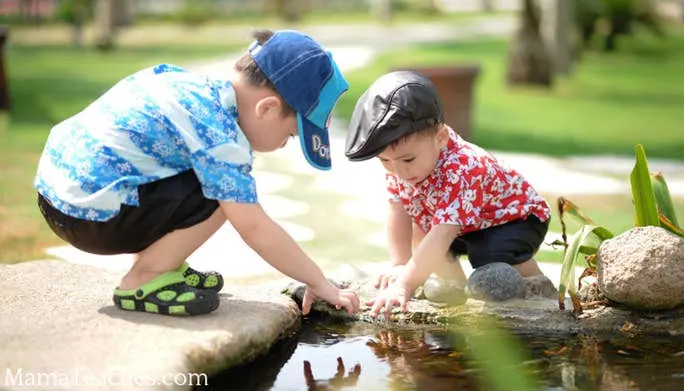
This article contains affiliate links to things that you might like.
It’s a non-negotiable in childhood.
If you’re debating the merits of play, here are 101 reasons why your kids need to play.
Why Kids Need to Play
- Play teaches children how to share space.
- Play teaches children how to share toys.
- Children learn how to share equipment.
- Taking turns is learned through play and practice.
- Children learn how to work with others.
- Teamwork is often needed in play.
- Children learn to problem solve while playing.
- Play encourages children to strategize.
- While playing, children learn what it means to be a member of a team.
- Playing can teach children how to be independent.
- Children learn how to entertain themselves through play.
- Playing encourages children to use their imaginations.
- Play helps build confidence.
- How to organize items can be learned through play.
- The understanding of cause-effect relationships is a natural extension of play.
- Play teaches children how to plan.
- Fine motor skill development occurs when playing.
- Gross motor skills are developed through play.
- Play is essential for the development of coordination.
- Children learn about balance while playing.
- Muscle development occurs through play.
- Playing helps children see the world differently.
- Playing helps build courage.
- While playing, children learn about personal space.
- Play makes kids happy.
- When children play, they increase blood flow in their bodies.
- An increase in blood flow can help children concentrate and focus on tough subjects in school.
- Play teaches children about colors.
- Shapes take on new meaning when children play with blocks and different building materials.
- Play helps children make self-to-world connections.
- Play is fun!
- Playing raises children’s awareness of the world around them.
- Play gives children time to be quiet and introspective.
- Learning how to control the volume of their voices is done while playing.
- Children build bonds with others while playing.
- Playing encourages children to explore their likes and dislikes.
- When children play, they learn to manipulate different materials.
- Textures come to life while playing.
- Play happens in many different forms.
- Play helps build memory.
- When children play with others they learn self-monitoring skills.
- Oral language develops when children play with others.
- Imaginative play helps children create dialogue.
- Children learn how to recognize symbols and signs when they play.
- Play encourages children to learn about roles.
- Routines and processes are developed through play.
- Play teaches delayed gratification.
- Children learn how to prioritize goals through play.
- Play forces children to examine the needs and wants of others.
- Play leads to cognitive maturity.
- Children learn to support one another through play.
- Sensory development is expanded through play with different materials.
- Children learn to see the world in different ways.
- Play encourages children to recognize their feelings.
- Emotions can be expressed appropriately through play.
- Play helps children focus.
- Play helps create students who are ready to learn.
- Play builds attention spans.
- Assertiveness is learned through play.
- Compassion and empathy are integral parts of playing with others.
- Play can help children work through difficult experiences like divorce or the death of a family member or friend.
- Unstructured play is great for building self-reliance.
- Play helps build coordination.
- Play makes kids laugh!
- Playing makes memories.
- Playing with others improves communication skills.
- When children play, they learn new skills.
- Old skills are practiced and refined while playing.
- Children learn about spatial relationships through play.
- Problem solving skills are introduced and developed through play with others.
- Play helps improve math skills.
- Dramatic play can bring history to life.
- Real life scenarios can be acted out through play.
- Play can help develop science skills.
- Dramatic play can help children explore different career paths.
- Play increases musical talent and awareness.
- Play helps children learn how to safely navigate their world.
- When children play, they build skills for the present and the future.
- Some of the best childhood memories can be made through free play.
- Play helps alleviate a child’s dependence on technology.
- Play gets children outdoors.
- Indoor play gives children options on rainy days.
- Play teaches about rules and regulations.
- Play teaches children resiliency.
- A child’s first experiences with skinned knees happens during play.
- Play helps children sleep better at night.
- Play makes kids smile.
- Play is a child’s job.
- Play builds bonds between children and adults.
- Bonds between children are also created during play time.
- Play helps children cross cultural and language boundaries.
- New ideas are created during play.
- Children learn how to improve on the way they do things when they play.
- Play is not limited by age.
- Play can happen anywhere.
- Humor develops through play.
- Learning happens when children play.
- Play brings about joy.
- Play teaches children about anticipation.
- Playing improves fine and gross motor coordination.
- Children’s reflexes improve during play.
- Play is one of the healthiest things your child can do to grow and develop.
Why do your kids play?
Read more fun 101 lists here!

